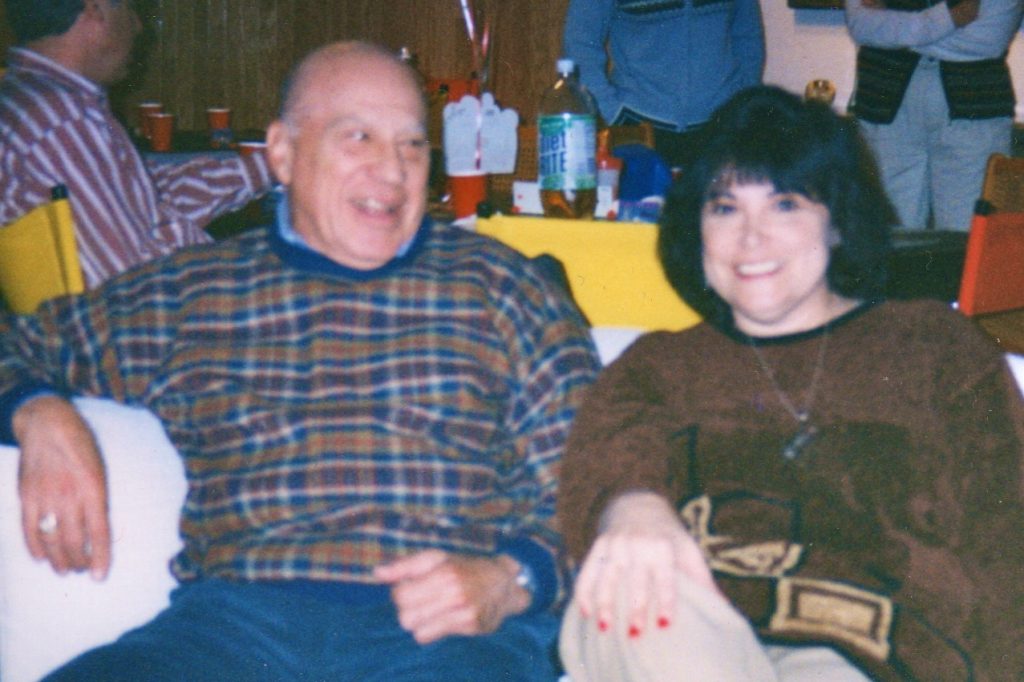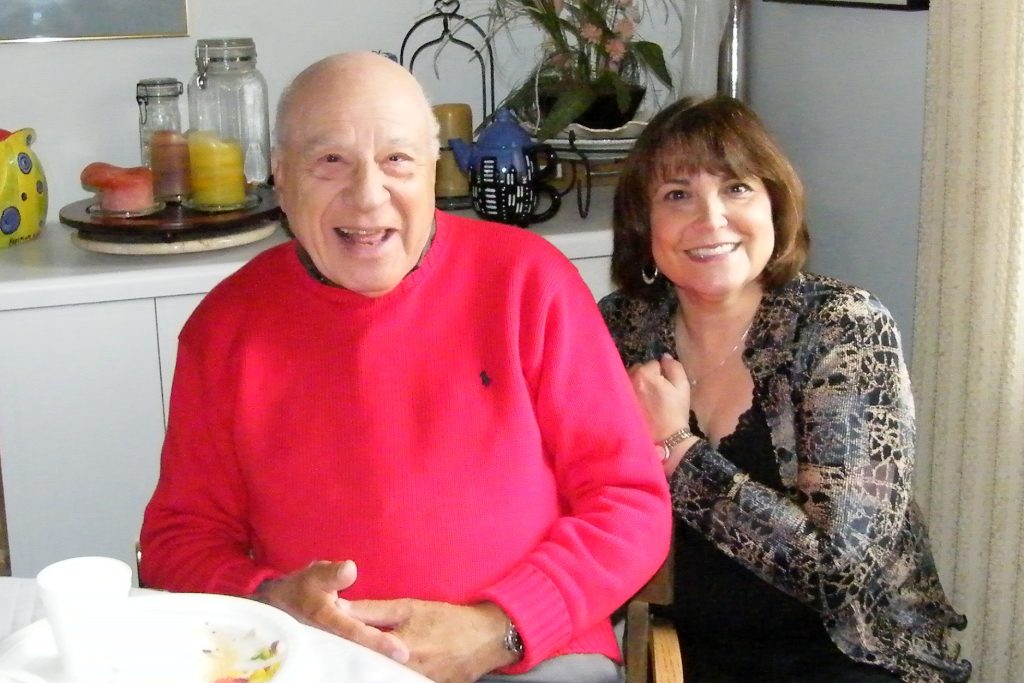
My father and I had a complicated relationship. I never doubted he loved me, but as he confessed about my daughters, he had no idea how to relate to girls. He took my son, his first grandson, to ball games, taught him to keep score, and played catch in the yard. But with his granddaughters, he mostly observed them and teased them about their clothes. It was a painful reminder of my relationship with him once I was too old for him to read me Golden Books. As my mother often said, he was always proud of me but just didn’t know how to express it.
As I mark my tenth Father’s Day without having a father, I am thinking about this most important choice my father helped me to make.
My father told me many things about politics, history, and art, which were his passions. And I did learn a lot from these mini-lectures. I will always be grateful to him for imparting his considerable knowledge. Strangely, however, when I broke up with my first college boyfriend, he drove to Ann Arbor to take me out to dinner and “set me straight,” or maybe or was to “clear the air.” These were his two favorite expressions, and I endured an awkward dinner conversation. But I knew it came from a place of love, and it meant a lot that he cared enough to try.
Often, what my father told me revealed his good intentions coupled with his inability to relate to my feelings. When President Kennedy was assassinated, I was distraught. While Dad acknowledged this was indeed a terrible thing, he launched into one of his lectures about how it was worse when FDR died in 1945. After all, he had been President since 1933 and had carried our country through the Depression and World War II. Perhaps, in retrospect, he had a point, but it was not what I needed to hear then. So, good talk, Dad.
There was one very important thing my father told me that changed the trajectory of my life. I had only applied to two colleges, Wayne State University (at that time a commuter school) and the University of Michigan. Ever loyal to his home state, Dad never talked to me about any other possibilities. I was accepted to both but leaning toward living at home and going to Wayne State. I had actually never been away from home by myself except for sleepovers with friends. I know my mother preferred this plan, but my father told me to go to Michigan, and that choice altered the course of my life. Perhaps he understood that I needed to leave home to reach my full potential. Or perhaps he simply admired the sports teams there. I’ll never know, but he did convince my mother that this was the best choice for me.
As I mark my tenth Father’s Day without having a father, I am thinking about this most important choice my father helped me to make. Thanks, Dad. That was indeed a good talk and I miss you.
Boomer. Educator. Advocate. Eclectic topics: grandkids, special needs, values, aging, loss, & whatever. Author: Terribly Strange and Wonderfully Real.





Thanx for sharing this Laurie!
My dad raised two girls, me and my sister, and was very involved in our young lives – I remember him taking us ice skating, to museums, on trips, often driving me to high school , and helping us make peace when we argued with our mother.
I never felt he had trouble relating to daughters, but when my son was born I was surprised to overhear him say to my husband – Thanx, I always wanted a boy!
So glad your father figured out “what to do with girls,” even though your son’s birth gave him the opportunity to do whatever boys did back then that was so different from what girls did. Ironically, my father’s first four great-grandchildren were little girls. By then he was ok with it.
Perhaps you point out a generational thing, Laurie. So many fathers of that era just didn’t know how to talk to their daughters (mine was an exception). Encouraging you to leave home and go to U of M was, indeed, an epic decision; one that changed your life in so many ways. That was the most important piece of advice he could have given you at that moment (and convinced your mother, too). So yes, good talk!
You are so right, Betsy. While I have lamented not having a father like yours who would listen to and not challenge my ideas, when it mattered most he was in my corner.
Fathers in the era when we were growing up likely did have trouble relating to daughters, Laurie, because men’s and women’s lives were so different. Despite the difficulties, he did care for you in his own way, and you have expressed it perfectly.
You are so right about that, Marian. His job was literally bread-winner and dispenser of wisdom. It was a Father Knows Best situation, although he never called me “Kitten.”
Your dad made the effort, clueless though he might have been on how to talk to girls. So he gets credit, as you recognize—it was probably as hard in him as it was on you to have the conversations. And he set you on a path that changed your life in a good way. Thanks for this story.
Thanks, Khati. He did try in his clueless way, and there’s a lot to be said for that.
A lovely and honest story, Laurie. You made clear that your father loved you greatly and yet just couldn’t relate to you (or girls generally). But his intentions were obviously good – -and, happily, that is not always the path to Hell. You have marked this sad tenth anniversary beautifully.
Thanks, John. Fathers of his era were quite different from my son and sons-in-law. Mine worked and shared his wisdom. Feelings, on the other hand, were not his thing. Ironically, he became very emotional whenever he expressed them. Perhaps that’s why he kept them so closely guarded.
Your father gave you good advice when it counted, telling you to go to Michigan and not Wayne State. My father, like yours, was not a great communicator, but, also like yours, I never doubted that he loved me.
Wonderful photos at 3 different stages of your life and his.
Thanks, Suzy. I suspect many men of that era were not big on communicating, especially about their feelings (see my comment to Tom).
Great story, Laurie. It prompts two quite disparate thoughts. The first is from Star Wars (the first one) when Yoda says to Luke, who has just said “I’ll try”: “No. Do or do not. There is no try.” Absolutely wrong. The “try” is the thing, and your father did his best. The other is about baseball: a .300 hitter is a great player but he makes an out 7 out of 10 times, which is not a great percentage. Your dad connected on the pitch that mattered and produced a game-winning result.
As a lifelong lover of baseball and the Detroit Tigers, my father would have appreciated your analogy. He did indeed hit that pitch out of the park for me and changed the course of my life. You are also right about the trying. My father rarely showed or talked about his feelings. On those few occasions that he did, he became very emotional, which I think he saw as weakness. That part makes me sad.
Lovely story, Laurie. I wonder, did your father have a sister/sisters? Sometimes that can make a difference in how comfortable/understanding a father is with his daughter(s), at least until he gets the hang of it. I think my own dad early on had no idea what to do. (Actually it was rather charming to see this.) Later we had a mind-meld and I was so proud to have this exclusive connection with him.
I love the photos of you two! How nice for you to have to remember the best of your relationship.
My father was the oldest of 4 and very close to his younger sister, only 18 months younger. His brother and baby sister were much younger. I had never thought about it in this context, so thanks for providing food for thought.
You were so fortunate to have a parent who supported your ambitions! My wife lacked that, and is sad about it to this day.
I am grateful to him for pushing me out of the nest.